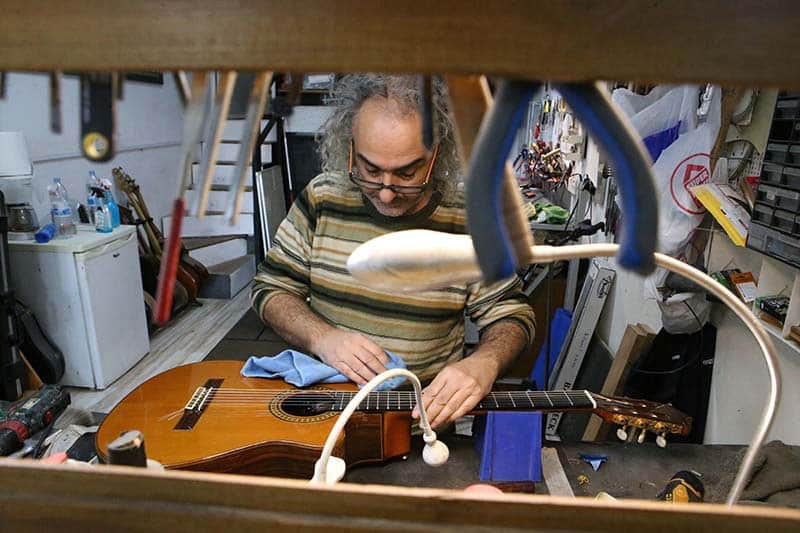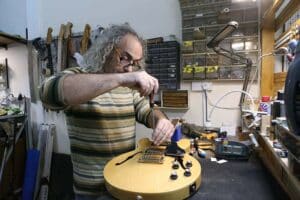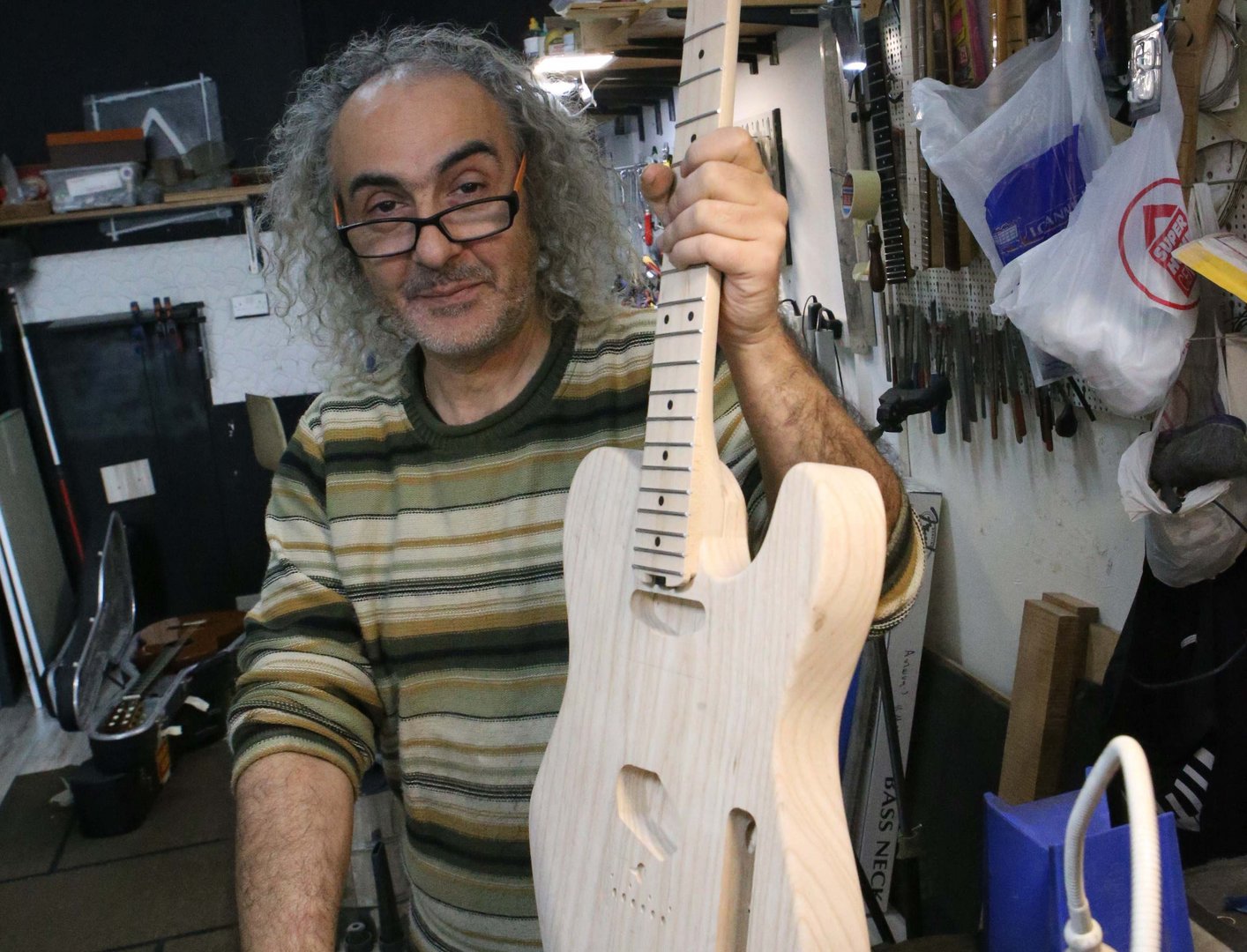In the only luthier on the island, THEO PANAYIDES finds a man who loves to talk who labours over custom-made instruments but will listen to ‘anything beautiful’ himself
The sign on the door says ‘Guitar Repair Collective’ – and one room is indeed set up for fixing recalcitrant instruments, with a workbench and a profusion of tools (I count 14 different kinds of screwdriver, then stop counting). The other room, however, behind a dividing wall and still in a certain disarray – he only moved to these premises a couple of months ago – is where the real magic happens, where George Papazoglou, a.k.a. ‘Dr. Fret’, plies his occasional trade as the only luthier (guitar-maker) in Cyprus. “I always tell my customers, draw me something on a piece of paper and I’ll turn it into a guitar for you,” he says, sitting behind a small desk and puffing at his third or fourth roll-up.
Making guitars, specifically electric guitars, is his passion – but it doesn’t pay the rent, especially in Cyprus where he moved (from Thessaloniki) almost 10 years ago. How many guitars does he make in a month? “A month?” he repeats, looking slightly bewildered. In fact, he’s only made 12 guitars from scratch during his decade here – though he’s made parts of instruments for companies in Europe, who assemble guitars from various luthiers and place their brand on the end result. It was better in Greece, though even there he’d only make two or three a year; the exception was the year 2000, just before the drachma was replaced by the euro, when people were afraid of how the new currency might affect prices and decided to splurge. He made 12 guitars in that one year, working flat-out.
How long does it usually take?
“It depends. Anywhere from four months to a year.”
What if he did nothing else? What if he could somehow make his living from it?
“If I devoted myself, maybe the year could be reduced to eight months,” he shrugs. That’s the dream, in his more fanciful moments – “to be on a mountain somewhere, in a little workshop. With my peace and quiet, my babbling brooks, my dogs, just cutting wood all day and making guitars”. Sounds nice, if perhaps a bit lonely. Would he say he’s something of an introvert? “Maybe,” says George, and chuckles.

These days are perhaps not his best days, indeed he admits as much. He takes his Greek coffee very sweet, and I also note a half-finished box of loukoumades (fried balls of dough dipped in syrup) on a table amid the clutter. It’s easy to imagine him subsisting on sugary snacks while he spends his days in this little workshop – as indeed he does. He comes in around 7.30, goes home for a couple of hours at lunch, then stays very late, 9pm or even later; his old premises were ideal, in that his neighbours were offices (there are people living above him in this new place) “so I could make my noise till one or two in the morning”. Working too much is one of his bad habits, he admits (the other is smoking), then again “I’ve also been doing it as a kind of work therapy”. George is alone, having been divorced for the past 10 years; his ex-wife is in Greece with their three sons – though his eldest boy is now at Tepak in Limassol, so at least that’s something.
He began repairing guitars in 1988, and started making his own in the mid-90s – but the pivotal point in his career was the move to Cyprus, driven out of Greece by the economic crisis and the punishing tax regime imposed by the government (when he left, three-quarters of his income was going to the state). “I had tons of work in Greece,” he explains with feeling; even the crisis was a blessing in disguise for him, because musicians preferred to repair or upgrade their old instruments instead of buying new ones – and George had years in the business, he was very well-known. “I was doing business with half of Greece”, fixing guitars from Thrace to Epirus. Still, the taxes were eating him alive, and a friend suggested that he join the stream of economic migrants to our fair isle; he came over briefly, spotted a gap in the market – no-one else was repairing electric guitars, let alone making them – sold off some of his equipment, put the rest in a container and came over; “I opened the shop, and waited for customers”. Alas, he should’ve done more research; there was almost no demand, at the time, for the specialised work he was doing. Even more fatally, he opened his shop in March 2013, a week before the haircut.
For a year, maybe two, he had almost no business. He wanted to move back, but couldn’t afford to. He was still married when he arrived in February (the plan was for his wife and kids to follow later), but the stress proved too much for the relationship. George tried to make ends meet, and thought about emigrating to Australia – yet he never got depressed, he’s not the type. “I move forward, my friend. I move forward,” he says firmly. “Not because I’m a positive person, I have my ups and downs – but the point is that yesterday was yesterday. It’s over, goodbye, let’s move on.”

Even in repair work, there’s a great satisfaction in finding a solution to a problem. But George Papazoglou isn’t really a repairman. He’s an artist – albeit one who seldom gets a chance to show his art, lurking doggedly in his workshop behind rows of screwdrivers.
He’s always been creative. Over the years he’s painted, dabbled in pottery and wood sculpture; “Any kind of art that’s done with the hands, I’ve tried it”. He also played guitar in various bands throughout his teens and 20s, which helps in understanding what musicians want even when they’re not quite able to articulate it. “If someone says – like a customer did yesterday – that I want the [guitar] neck like this a bit, because I do this and this when I play, I’ll say ‘Go, and come back when it’s ready. I know what you mean’.” (The customer in question didn’t like the grip on his old guitar, and wanted something narrower and more rounded.) What does he most admire in people? Creativity, he replies at once.
“It’s really important,” says George, torn between being balanced and waxing lyrical – “or at least that’s how I see it, someone else might think ‘What’s the big deal?’ – that we’re taking a piece of wood and giving it shape, and eventually turning it into an instrument that’ll give joy, that’ll inspire, when you see a musician expressing themselves through this thing – which, a few months ago, was just a bit of wood on a tree. And, you know – not to sound like an eco-warrior, I’m really not – but that tree was once a living thing – it’s not a rock, let’s put it that way – so you’re basically giving it a second chance to live. And to live in the hands of a musician, who’ll express his music, which makes other people happy – which makes him happy. Because musicians, like all artists, are a little bit perverted,” he adds with a chuckle, “so they find joy in different things than normal people. Their brain works a little bit differently.”
He himself has a touch of that ‘perverted’ side – albeit grounded by life, and circumstances. The work has taught him patience (he was patient with his kids too), he’s “not the panicky type”. He’s always been flexible, always able to go with the flow. The sobering fact, after all, is that he’ll never earn a living from his “passion” in Greece or Cyprus; custom-made guitars aren’t cheap – his creations start at around €2,000, which is actually low by most standards – but the bulk of that goes on raw materials, and neither country has the right kind of timber so it has to be imported (the problem isn’t the type of wood, so much as the size of the trees). Not to mention that guitars are now mass-produced, and technology allows musicians to sound good with an average instrument anyway.
George goes next door and returns with a big block of wood, 4.5cm thick to be precise. His face lights up, his already chatty manner grows even chattier. The wood is swamp ash, from North America. A template is placed on the wood (he shows me how), cut to the customer’s specifications, then the wood itself is cut with a power tool known as a router. The luthier is a carpenter at this stage – but then he turns into a sculptor, chipping away at the base till it’s rounded and elegant. Then comes the neck (the hardest part), and the carving of the frets which of course must be just right, otherwise the whole job is ruined; then the neck must be trimmed. It takes 48 working hours – working hours, he repeats, not just hours – just to trim the neck. Then neck and base have to be fused, then painting, varnishing…
Art is easy to describe, hard to execute – or perhaps it’s more a case of craft being easy to describe, hard to execute to the point where it becomes art. George Papazoglou seems to lead a solitary life; he seldom goes out (he went out enough when he was young, he assures me), spends most of his time in this little workshop – but it doesn’t matter, he can’t wait to come to work every morning.
“God gave me the gift – the passion, whatever – to build things, and I feel very lucky. Maybe my life in general, in terms of career let’s say, might not have gone as well as it could have, financially and so on – and OK, you think about that, because you grow older, you get tired, you have obligations. But I feel really good, especially compared to the people I see who are living a miserable life – behind a desk, God forbid.”
What does he miss about Greece? “Everything and nothing,” he replies with a chuckle. That was then, this is now. He moves forward, thinking of the next day, the next job – the next custom-made, lifetime-guaranteed guitar to labour over. Two of his creations hang from pegs in the wall, one of them almost ready to share with the world. George takes it down and shows me – the rounded lines, the colours, the shine of the varnish – then puts it back tenderly.







Click here to change your cookie preferences